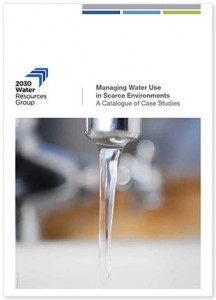Call for innovative solutions for managing water scarcity

The impact of water crises around the world has been recently recognized as a top risk by the World Economic Forum with business leaders reporting concerns over looming water crises. This highlights the importance of innovative and novel solutions to help manage and mitigate the risk of water crises affecting society, industry and the environment.
The 2030 Water Resources Group is taking a leading role in identifying and publishing examples of initiatives that have been implemented to manage water scarcity. In 2013, on behalf of the 2030 Water Resources Group, Arup identified 39 case studies from around the world that showcased such innovative solutions in ‘Managing Water Use in Scarce Environments: A Catalogue of Case Studies’. The publication inspires action and is utilized throughout the world by leading industry, policy makers and the 2030 WRG country programmes.
Following the 2013 publication, the 2030 WRG is launching a revised and updated catalogue of initiatives that have been undertaken to reduce water use or manage water risk. This will be launched at Stockholm World Water Week 2015 and disseminated widely across leading corporates and national policy makers.
Submit an initiative
If you have an initiative that you would like to be considered for inclusion in this extended publication please get in touch at water.scarcity.solutions@arup.com with the following information:
- Where was your initiative located?
- What were the objectives and outcomes of the intervention?
- When was the intervention undertaken?
- What data is available?
About 2030 WRG
The 2030 Water Resources Group is a unique public-private-civil society collaboration. We facilitate open, trust-based dialogue processes to drive action on water resources reform in water stressed countries in developing economies. The ultimate aim of such reforms and actions is to close the gap between water demand and supply by the year 2030.
The 2030 WRG emerged in 2009 through an informal collaboration between the International Finance Corporation (IFC), the World Economic Forum (WEF), multilateral and bilateral agencies (Swiss Development Corporation), private sector companies (Nestlé, PepsiCo, The Coca-Cola Company), and other organizations such as the World Wildlife Fund (WWF).
